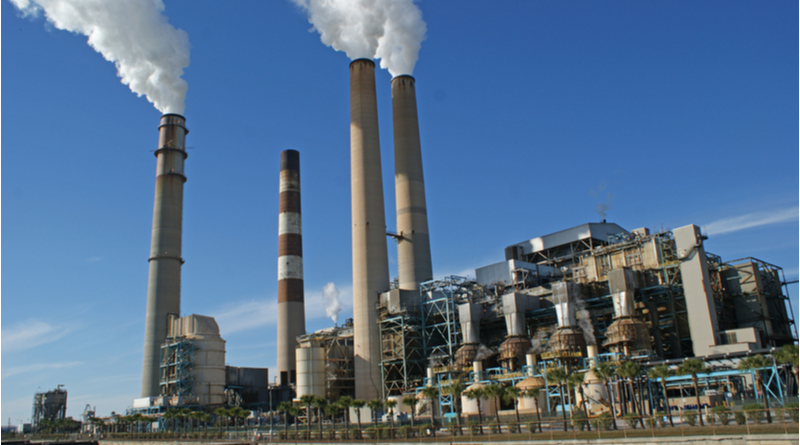Opinion: Love, Justice And Climate Change – Fossil Fuel Racism

Big Bend coal-fired power plant near Tampa, FL situated in a community with a great many Black, Brown, and poor people. Photo: Alan Kraft.

Environmental racism opponents have for years protested and raised awareness about toxic waste sites, polluting factories and power plants, and the frequency with which they are located in or near communities of color. Their campaigns have targeted the vital issues of public health and race, and less often focused on climate change.
Climate activists have been aware that climate change is disproportionately affecting frontline nations of people of color around the world and recognized this as racism. However, many predominately white climate organizations have tended to focus their organizing around greenhouse gas emissions and their climate effects, with less attention to public health issues or racism.
New Report – Fossil Fuel Racism
Greenpeace, the Movement for Black Lives, and the Gulf Coast Center for Law and Policy have jointly authored a new report titled “Fossil Fuel Racism” that brings these issues together in a new way. They explain that every stage of coal, oil, and gas lifecycles–extraction, processing, transport, and combustion–generates toxic air and water pollution and greenhouse gas emissions. At each stage fossil fuels create public health hazards. At each stage they worsen the climate crisis. Both their public health effects and the effects of climate change fall disproportionately on Black, Latinx, Indigenous, Asian and poor communities.
I’ve been writing for some time about how connected climate change and racism are. This report both confirms that and takes the analysis a step further. It also proposes the obvious remedy and highlights the present moment in the U.S., saying: “President Joe Biden and the 117th Congress have a historic opportunity to improve public health, tackle the climate crisis, and confront systemic racism at the same time by phasing out fossil fuel production and use.”
Air Pollution From Fossil Fuels
The public health effects of fossil fuels are staggering. This new paper reports that in 2018 there were roughly 355,000 premature deaths in the U.S. due to fossil fuel linked air pollution. Globally, 8.7 million deaths per year are attributable to particulate pollution from the burning of fossil fuels. In the U.S. African Americans have one and a half times the exposure to particulate matter pollution of the general population. This is driven especially by emissions from coal-fired power plants and gas and diesel-powered vehicles, which disproportionately affect BIPOC and poor communities. African Americans are 40% more likely to have asthma and are almost 3 times more likely to die of asthma related causes than white people in the U.S.
The extraction and processing of oil and gas release hazardous air pollutants including carcinogens such as benzene and chemicals that disrupt human hormones. Oil refineries and petrochemical facilities (particularly those producing inputs for plastics) are among the worst polluters–and again the harmful effects are borne disproportionately by BIPOC communities.
Disproportionate Effects Of Climate Change
The climate change resulting from fossil fuel emissions also disproportionately harms BIPOC. Indigenous and Black communities in Alaska and in Louisiana are facing relocation as a result of climate-change-induced melting in the Arctic and sea-level rise in the Gulf. Past racist practices of redlining and housing discrimination have concentrated many black and brown people in urban areas. Areas that were previously redlined now experience higher levels of dangerous extreme heat exposure and a 25% greater risk of flooding than non-redlined areas. Racism and the poverty it has caused have also left BIPOC populations less able to prepare for, escape, or recover from, climate disasters–because of reduced access to health care, emergency funds, transportation, housing loans, employment, etc.
Racism Is Essential To A Fossil Fuel Economy
One way in which the fossil fuel industry depends on racism for its very existence is in the necessity of sacrifice zones. If toxic refineries, power plants, and petrochemical plants all had to be placed in middle and owning class white communities our reliance on fossil fuels would have been drastically reduced years ago. It’s only because racism allows BIPOC people to be seen as disposable and allows their communities to be turned into sacrifice zones, that we have this harmful, polluting system of energy production that targets people of color in every phase of its operation.
Vital Policies
This new report makes four other key points.
- Policies must not only encourage renewable solutions but must actively phase out fossil fuel production and “prevent new investments that lock in future fossil fuel” pollution and greenhouse gas emissions.
- It is not enough to simply reduce the national total of fossil fuel emissions. The reductions must address the disproportionate nature of the emissions affecting black and brown communities in order to address racial justice and to maximize the positive effects on public health.
- As we transition away from fossil fuels we must ensure that no worker or community is left behind. Policies must guarantee wage, benefit, and pension protection for workers and create 15 million good jobs in this decade, while upholding rigorous labor, climate, and equity standards.
- Democracy must be protected against racist voter suppression tactics.
The goal for both climate and racial justice is clear: “tackle the climate crisis, and confront systemic racism at the same time by phasing out fossil fuel production and use.”
What Is Our Role In Ending Fossil Fuel Racism?
There is new positive governmental action in the U.S on these fronts, but it is still not broad enough or fast enough to avoid catastrophe. We can each play a role in helping to bring about the necessary acceleration. Policy changes can make a difference at the local, state, and national levels. Join with others in climate and racial justice organizations–local or national–and help build the pressure for decisive action to rapidly phase out fossil fuels. Even the best-intentioned political leaders need an activated, outspoken public behind them.
Notes:
- “BIPOC” stands for Black, Indigenous (and other) People of Color
- In the text above any quotes or information not otherwise linked come from “Fossil Fuel Racism” (2021).\
Russ Vernon-Jones was the Principal of Fort River Elementary School from 1990 to 2008. He is a co-facilitator of the Coming Together Anti-Racism Project in the Amherst area. He chairs the Racism, White Supremacy, and Climate Justice working group of Climate Action Now of Western Mass., and blogs regularly on climate justice at www.RussVernonJones.org.
